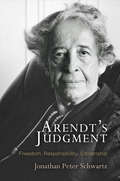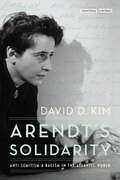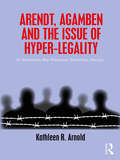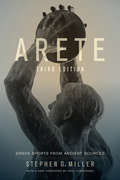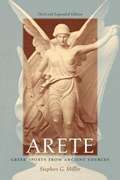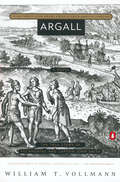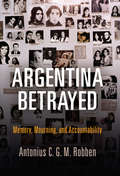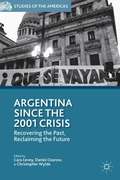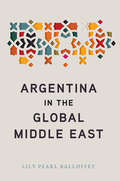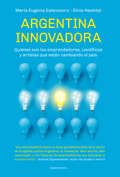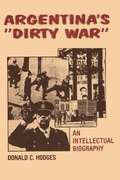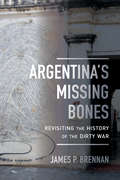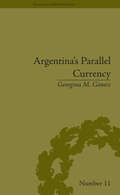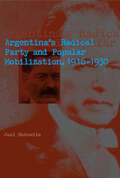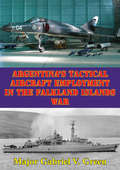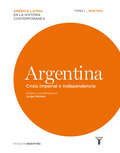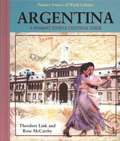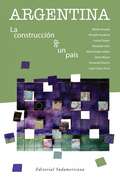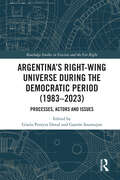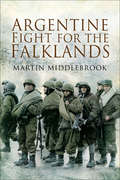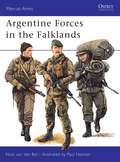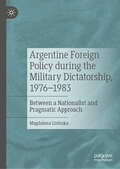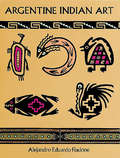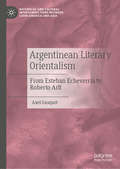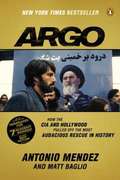- Table View
- List View
Arendt's Judgment: Freedom, Responsibility, Citizenship
by Jonathan Peter SchwartzIn Arendt's Judgment, Jonathan Peter Schwartz explores the nature of human judgment, the subject of the planned third volume of Hannah Arendt's The Life of the Mind, which was left unwritten at the time of her death. Arguing that previous interpretations of Arendt failed to fully appreciate the central place of judgment in her thought, Schwartz contends that understanding Arendt's ideas requires not only interpreting her published work but also reconstructing her thinking from a broader range of sources, including her various essays, lecture course notes, unpublished material, and correspondence. When these sources are taken into account, it becomes clear that, for Arendt, political judgment was the answer to the question of how human freedom could be realized in the modern world.This new approach to understanding Arendt leads to what Schwartz argues are original insights Arendt can teach us about the nature of politics beyond sovereignty and the role of human agency in history. Above all, her novel understanding of the authentic nature and purpose of political philosophy is finally revealed. Schwartz claims that in her theory of political judgment Arendt presented a vision of political philosophy that is improved and deepened by the contributions of ordinary, active citizens. Along with challenging previous interpretations, Arendt's Judgment provides a roadmap to her published and unpublished work for scholars and students.
Arendt's Solidarity: Anti-Semitism and Racism in the Atlantic World (Cultural Memory in the Present)
by David D. KimHannah Arendt's work inspires many to stand in solidarity against authoritarianism, racial or gender-based violence, climate change, and right-wing populism. But what if a careful analysis of her oeuvre reveals a darker side to this intellectual legacy? What if solidarity, as she conceives of it, is not oriented toward equality, freedom, or justice for all, but creates a barrier to intersectional coalition building? In Arendt's Solidarity, David D. Kim illuminates Arendt's lifelong struggle with this deceptively straightforward yet divisive concept. Drawing upon her publications, unpublished documents, private letters, radio and television interviews, newspaper clippings, and archival marginalia, Kim examines how Arendt refutes solidarity as an effective political force against anti-Semitism, racial injustice, or social inequality. As Kim reveals, this conceptual conundrum follows the arc of Arendt's forced migration across the Atlantic and is directly related to every major concern of hers: Christian neighborly love, friendship, Jewish assimilation, Zionism, National Socialism, the American republic, Black Power, revolution, violence, and the human world. Kim places these thoughts in dialogue with dissenting voices, such as Thomas Mann, Gershom Scholem, Jean-Paul Sartre, James Baldwin, Frantz Fanon, James Forman, and Ralph Ellison. The result is a full-scale reinterpretation of Arendt's oeuvre.
Arendt, Agamben and the Issue of Hyper-Legality: In Between the Prisoner-Stateless Nexus
by Kathleen R. ArnoldIn the Origins of Totalitarianism, Hannah Arendt famously argued that the stateless were so rightless, that it was better to be a criminal who at least had some rights and protections. In this book, Kathleen R. Arnold examines Arendt’s comparison in the context of post-1996 U.S. criminal and immigration policies, arguing that the criminal-stateless binary is significant to contemporary politics and yet flawed. A key distinction made today is that immigrant detention is not imprisonment because it is a civil system. In turn, prisoners are still citizens in some respects but have relatively few rights since the legal underpinnings of "cruel and unusual" have shifted in recent times. The two systems – immigrant detention and the prison system – are also concretely related as they often house both populations and utilize the same techniques (such as administrative segregation). Arnold compellingly argues that prisoners are essentially made into foreigners in these spaces, while immigrants in detention are cast as outlaws. Examining legal theory, political theory and discussing specific cases to illustrate her claims, Arendt, Agamben and the Issue of Hyper-Legality operates on three levels to expose the degree to which prisoners’ rights have been suspended and how immigrant policy and detention cast foreigners as inherently criminal. Less talked about, the government in turn expands sovereign, discretionary power and secrecy at the expense of openness, transparency and democratic community. This book will be of interest to scholars and students of contemporary political theory, philosophy and law, immigration, and incarceration.
Arete
by Stephen G. Miller Paul ChristesenFrom the informal games of Homer's time to the highly organized contests of the Roman world, Miller has compileda trove of ancient sources: Plutarch on boxing, Aristotle on the pentathlon, Philostratos on the buying and selling of victories, Vitruvius on literary competitions, and Xenophon on female body building. Arete offers readers an absorbing lesson in the culture of Greek athletics from the greatest of teachers, the ancients themselves, and demonstrates that the concepts of virtue, skill, pride, valor, and nobility embedded in the word arete are only part of the story from antiquity. This bestselling volume on the culture of Greek athletics is updated with a new preface by leading scholar Paul Christesen that discusses the book's continued importance for students of ancient athletics.
Arete: Greek Sports from Ancient Sources (3rd and Expanded Edition)
by Stephen G. MillerThird and expanded edition of this classic work of scholarship on the sports of ancient Greece.
Argall
by William T. VollmannIn Argall, the newest novel in his Seven Dreams series, William T. Vollmann alternates between extravagant Elizabethan language and gritty realism in an attempt to dig beneath the legend surrounding Pocahontas, John Smith, and the founding of the Jamestown colony in Virginia-as well as the betrayals, disappointments, and atrocities behind it. With the same panoramic vision, mythic sensibility, and stylistic daring that he brought to the previous novels in the Seven Dreams series-hailed upon its inception as "the most important literary project of the '90s" (The Washington Post)-Vollmann continues his hugely original fictional history of the clash of Native Americans and Europeans in the New World. In reconstructing America's past as tragedy, nightmare, and bloody spectacle, Vollmann does nothing less than reinvent the American novel.
Argentina Betrayed: Memory, Mourning, and Accountability (Pennsylvania Studies in Human Rights)
by Antonius C. Robben<p>The ruthless military dictatorship that ruled Argentina between 1976 and 1983 betrayed the country's people, presiding over massive disappearances of its citizenry and, in the process, destroying the state's trustworthiness as the guardian of safety and well-being. Desperate relatives risked their lives to find the disappeared, and one group of mothers defied the repressive regime with weekly protests at the Plaza de Mayo in Buenos Aires. How do societies cope with human losses and sociocultural traumas in the aftermath of such instances of political violence and state terror? <p>In <i>Argentina Betrayed</i>, Antonius C. G. M. Robben demonstrates that the dynamics of trust and betrayal that convulsed Argentina during the dictatorship did not end when democracy returned but rather persisted in confrontations over issues such as the truth about the disappearances, the commemoration of the past, and the guilt and accountability of perpetrators. Successive governments failed to resolve these debates because of erratic policies made under pressure from both military and human rights groups. Mutual mistrust between the state, retired officers, former insurgents, and bereaved relatives has been fueled by recurrent revelations and controversies that prevent Argentine society from conclusively coming to terms with its traumatic past. <p>With thirty years of scholarly engagement with Argentina—and drawing on his extensive, fair-minded interviews with principals at all points along the political spectrum—Robben explores how these ongoing dynamics have influenced the complicated mourning over violent deaths and disappearances. His analysis deploys key concepts from the contemporary literature of human rights, transitional justice, peace and reconciliation, and memory studies, including notions of trauma, denial, accountability, and mourning. The resulting volume is an indispensable contribution to a better understanding of the terrible crimes committed by the Argentine dictatorship in the 1970s and their aftermath.</p>
Argentina Since the 2001 Crisis
by Christopher Wylde Cara Levey Daniel OzarowThis timely and interdisciplinary volume analyzes the many impacts of and contrasting responses to the Argentine political, economic, and social crises of 2001-02. Chapters offer original theoretical models and examine the relationship between political, cultural, economic, and societal spheres.
Argentina in the Global Middle East
by Lily Pearl BalloffetArgentina lies at the heart of the American hemisphere's history of global migration booms of the mid-nineteenth to early twentieth century: by 1910, one of every three Argentine residents was an immigrant—twice the demographic impact that the United States experienced in the boom period. In this context, some one hundred and forty thousand Ottoman Syrians came to Argentina prior to World War I, and over the following decades Middle Eastern communities, institutions, and businesses dotted the landscape of Argentina from bustling Buenos Aires to Argentina's most remote frontiers. Argentina in the Global Middle East connects modern Latin American and Middle Eastern history through their shared links to global migration systems. By following the mobile lives of individuals with roots in the Levantine Middle East, Lily Pearl Balloffet sheds light on the intersections of ethnicity, migrant–homeland ties, and international relations. Ranging from the nineteenth century boom in transoceanic migration to twenty-first century dynamics of large-scale migration and displacement in the Arabic-speaking Eastern Mediterranean, this book considers key themes such as cultural production, philanthropy, anti-imperial activism, and financial networks over the course of several generations of this diasporic community. Balloffet's study situates this transregional history of Argentina and the Middle East within a larger story of South-South alliances, solidarities, and exchanges.
Argentina innovadora: Quiénes son los emprendedores, científicos y artistas que están cambiando el país
by Silvia Naishtat María Eugenia EstenssoroCómo hicieron los emprendedores tecnológicos que hace veinte años decidieron realizar el sueño de una nación innovadora y creativa, reconocida por su talento en el resto del mundo. En América Latina hay siete unicornios, y cuatro son argentinos. No se trata de seres mitológicos, sino de empresas tecnológicas valuadas en más de mil millones de dólares. No solo se distinguen por su valor, sino por llevar en su ADN una gran dosis de espíritu rupturista e innovador. Surgieron y se desarrollaron a contramano de la realidad local, y hoy son multinacionales que generan riqueza, trabajo de calidad y crecimiento sostenido. Mercado Libre es la principal plataforma de comercio electrónico de habla hispana y un caso de estudio en la Universidad de Stanford. Despegar es la quinta agencia de turismo del mundo. Globant suministra tecnología a empresas como Disney y Google. OLX está presente en ciento veinte países y es la mayor compañía de venta de clasificados por internet en la India. Pero no son casos excepcionales, y el término "unicornios" se extiende a otras empresas con las mismas características: Gran Data anticipa el comportamiento de los consumidores para las principales compañías telefónicas de los Estados Unidos; Satellogic ya lanzó cinco satélites al espacio que brindan imágenes con una resolución nunca antes alcanzada; y Bioceres posee un gen resistente a la sequía que puede permitir una nueva revolución productiva en el agro. Luego de dos años de viajes y entrevistas, María Eugenia Estenssoro y Silvia Naishtat concluyen que estos son ejemplos descollantes de que la Argentina no es solo un semillero de futbolistas de calidad internacional: con políticas públicas adecuadas, el país puede aspirar también a ser un polo mundial de innovación en áreas tan diversas como la biotecnología, el arte y la comunicación.
Argentina's "Dirty War": An Intellectual Biography
by Donald C. HodgesArgentines ask how their ultracivilized country, reputedly the most European in Latin America, could have relapsed into near-barbarism in the 1970s. This enlightening study seeks to answer that question by reviewing the underlying political events and intellectual foundations of the "dirty war" (1975-1978) and overlapping Military Process (1976-1982). It examines the ideologies and actions of the main protagonists-the armed forces, guerrillas, and organized labor- over time and traces them to their roots. In the most comprehensive treatment of the subject to date, Hodges examines primary materials never seen by other researchers, including clandestinely published guerrilla documents, and interviews important actors in Argentina's political drama. His wide-ranging scholarship traces the origins of the national security and national salvation doctrines to the Spanish Inquisition, sixteenth-century witch hunts, and nineteenth-century reactions to the modernizing ideologies of liberalism, democracy, socialism, and communism. Hodges posits that the "dirty war," Military Process, and revolutionary war to which they responded represented the culmination of social tensions that arose in 1930 with the launching of the Military Era by Argentina's first successful twentieth-century coup. He offers the disquieting hypothesis that as long as the "Argentine Question" remains unsettled the military may intervene again, the resistance movement will remain strong, and violence may continue even under a democratic government. Donald C. Hodges (1923-2009) was professor of philosophy and affiliate professor of political science at Florida State University.
Argentina's Missing Bones: Revisiting the History of the Dirty War (Violence in Latin American History #6)
by James P. BrennanArgentina’s Missing Bones is the first comprehensive English-language work of historical scholarship on the 1976–83 military dictatorship and Argentina’s notorious experience with state terrorism during the so-called dirty war. It examines this history in a single but crucial place: Córdoba, Argentina’s second largest city. A site of thunderous working-class and student protest prior to the dictatorship, it later became a place where state terrorism was particularly cruel. Considering the legacy of this violent period, James P. Brennan examines the role of the state in constructing a public memory of the violence and in holding those responsible accountable through the most extensive trials for crimes against humanity to take place anywhere in Latin America.
Argentina's Parallel Currency: The Economy of the Poor (Financial History)
by Georgina M GomezAnalyzes the rise and fall of the Red de Trueque (launched in 1995 by a group of environmentalists who exchanged goods and services at their own 'market' using a system of mutual credit) in Argentina. This book identifies rules of governance and sustainability for institutional settings in which state regulation is minimal.
Argentina's Radical Party and Popular Mobilization, 1916–1930
by Joel HorowitzDemocracy has always been an especially volatile form of government, and efforts to create it in places like Iraq need to take into account the historical conditions for its success and sustainability. In this book, Joel Horowitz examines its first appearance in a country that appeared to satisfy all the criteria that political development theorists of the 1950s and 1960s identified as crucial. This experiment lasted in Argentina from 1916 to 1930, when it ended in a military coup that left a troubled political legacy for decades to come. What explains the initial success but ultimate failure of democracy during this period? Horowitz challenges previous interpretations that emphasize the role of clientelism and patronage. He argues that they fail to account fully for the Radical Party government’s ability to mobilize widespread popular support. Instead, by comparing the administrations of Hipólito Yrigoyen and Marcelo T. de Alvear, he shows how much depended on the image that Yrigoyen managed to create for himself: a secular savior who cared deeply about the less fortunate, and the embodiment of the nation. But the story is even more complex because, while failing to instill personalistic loyalty, Alvear did succeed in constructing strong ties with unions, which played a key role in undergirding the strength of both leaders’ regimes. Later successes and failures of Argentine democracy, from Juan Perón through the present, cannot be fully understood without knowing the story of the Radical Party in this earlier period.
Argentina's Tactical Aircraft Employment In The Falkland Islands War
by Major Gabriel V. GreenThe aerial forces of the Argentinean Air Force and Navy found themselves in a complex, unenviable position during the 1982 conflict with Great Britain for possession of the Falkland Islands/Islas Malvinas. Despite Argentinean numerical superiority, the modern weaponry and tactical proficiency of the United Kingdom's armed forces were a formidable threat. The Argentineans found themselves in a disadvantaged tactical situation due to a lack of preparation to include planning, intelligence, training, and resources necessary to counter a sophisticated military threat. To lessen their disadvantage, the Argentineans reorganized their Air Force; leveraged the tactical skill, innovation, and determination of their pilots; and employed their newly acquired air-launched Exocet anti-ship missile. This paper examines the context of the Argentinean political situation, explores the condition and reaction of the Air Force and Naval Air Arm to imminent conflict, details the aerial combat employment outcomes, and concludes with an evaluation of the results.Worldwide headlines declared either invasion or liberation on 2 April 1982. These words explained how both London and Buenos Aires felt after the Argentineans seized the Falkland Islands from the United Kingdom. Because of this action, the aerial forces of the Argentinean Air Force and Navy found themselves in a complex, unenviable position during the conflict with Great Britain for possession of the Falkland Islands. The Argentineans were in a disadvantaged tactical situation due to a lack of preparation to include planning, intelligence, training, and resources necessary to counter a sophisticated military threat. To lessen their disadvantage, the Argentineans reorganized their Air Force; leveraged the tactical skill, innovation, and determination of their pilots; and employed their newly acquired air-launched Exocet anti-ship missile.
Argentina. Crisis imperial e independencia. Tomo 1 (1808-1830)
by Varios AutoresTomo I de Argentina en la Colección América Latina en la Historia Contemporánea. Dirigido y coordinado por Jorge Gelman. En el periodo comprendido entre 1808 y 1830 se produjeron cambios de una intensidad pocas veces vista en la historia. Éstos no sólo afectaron a Argentina, sino que además, tanto en Europa como en América, tuvieron lugar profundas transformaciones políticas, sociales, económicas y culturales. En lo que había sido el virreinato del Río de la Plata desde 1810 se abre un periodo de fuertes innovaciones que tienen como punto de inflexión la llegada de Rosas al poder. Esta etapa clave se analiza en este primer volumen sobre la historia contemporánea de Argentina desde perspectivas profundamente renovadoras. La colección América Latina en la Historia Contemporánea es uno de los proyectos editoriales más importantes de las últimas décadas y una aportación original y novedosa a la historiografía sobre América Latina en la que han participado más de 400 historiadores de diversos países. Presenta una visión plural y accesible de la historia contemporánea de las naciones latinoamericanas -incluyendo aquellas otras, europeas o americanas, que más han aportado a su materialización- y revela las claves políticas, sociales, económicas y culturales que han determinado su trayectoria y el lugar en el mundo que hoy ocupan.
Argentina: A Primary Source Cultural Guide
by Theodore Link Rose MccarthyArgentina boasts pristine deserts, sprawling beaches, rich plains, and hilly forests. The rugged Andes Mountains are home to a preserved colonial city, archaeological sites, wildlife refuges, subtropical forests, and desert canyons. Readers will revel in the excitement of soccer, the romance of tango, the glory of folklore, and the mystery of ancient cultures. They will also learn about the generations of dictatorial rule, revolving-door governments, corruption, tax evasion, and misguided financial policies that have created political and economic problems that Argentines have been unable to shake.
Argentina: La construcción de un país
by Fernando Rocchi Juan Carlos Torre Mirta Zaida LobatoDiferentes autores analizan circunstancias clave en la organizaciónsocial de la Argentina desde varias perspectivas. Para cada crisis la historia registra respuestas con peculiaridades. LaArgentina no está desconectada del mundo, no lo estuvo en el pasado nilo estará. Esta compilación trata, justamente, de algunas circunstanciasen la organización social argentina. El texto, como un todo, pretendeser un ejercicio de memoria para pensar el mañana. La historia es unproceso social complejo, cuyos actores tienen intereses e ideales que secruzan con otros y que conforman un determinado «lazo social». Ahorabien, cada uno de esos momentos fue una construcción política. Nada ninadie es neutral. En este contexto cada uno de los capítulosseleccionados recrea algunas de las características de esa gran obra.Cada autor revela aspectos de una trama que se resuelve creando algonuevo o reinstalando lo viejo. Diferentes voces, concepciones y lasdistintas dimensiones de la vida social. Frente a una nueva oportunidadhistórica construyamos el futuro aprovechando la experiencia.
Argentina’s Right-Wing Universe During the Democratic Period: Processes, Actors and Issues (Routledge Studies in Fascism and the Far Right)
by Gisela Pereyra Doval Gastón SouroujonArgentina’s Right-Wing Universe During the Democratic Period provides a comprehensive analysis of the course of right-wing politics in the country in the last 40 years. In 1983, after the fall of a violent military regime, Argentina began the longest period of democratic stability in its history—40 years marked by economic, institutional, social and political crises. This book examines the trajectory of the different right-wing organisations and ideological developments during these years, seeking to understand both the distinctions and the continuities that lie beneath its metamorphoses. Argentina has always acted as a laboratory in which to appreciate how the major problems and questions that concern those who have studied the right-wing in recent decades are translated into a particular political culture. In an international scenario marked by the social and political growth of different right-wing movements, some of which pose a threat to liberal democracies, the study of the Argentine case can provide greater clarity and a different perspective on problems that transcend this specific national case. This book will be of interest to scholars of Argentinian and Latin American politics and history, as well as specialists on the comparative politics of the radical right.
Argentine Fight for the Falklands (Pen And Sword Military Classics Ser. #No. 21)
by Martin MiddlebrookAn account by the only British historian to have been granted open access to the Argentines who planned and fought the Falklands War. Avoiding involvement in the issue of sovereignty and concentrating entirely upon the military story, this history is a unique and balanced look at the 1982 war for the islands that the UK called the Falklands and Argentina called the Malvinas, a ten-week conflict that killed nearly a thousand people. Among the men the author met were the captain of the ship that took the scrap-metal merchants to South Georgia; the admiral in charge of planning the Falklands invasion; the marine commander and other members of the invasion force; two brigadier-generals, five unit commanders, and many other men of the large army force sent to occupy and defend the islands; the officer in charge of the Argentine garrison at Goose Green; and, finally, the brigadier-general responsible for the defense of Port Stanley and soldiers of all ranks who fought the final battles.
Argentine Forces in the Falklands
by Paul Hannon Nick BijlThe announcement of the imminent withdrawal of the British Royal Navy's ice patrol ship HMS Endurance in early 1982 prompted the Argentinian Junta in Buenos Aires to plan a military grab of the Falklands -- a siege they assumed would succeed with little resistance. Such an adventure was attractive as a distraction for the Argentine public at a time of political unease. In April, the Junta, led by Gen. Leopoldo Galtieri, made its move. This fascinating book examines the history, organization and equipment of the Argentine forces that battled for control of this remote British outpost during the Falklands War (1982).
Argentine Foreign Policy during the Military Dictatorship, 1976–1983: Between a Nationalist and Pragmatic Approach
by Magdalena LisińskaThis book examines Argentine foreign policy under the military dictatorship from 1976–1983, also known as the National Reorganization Process. It brings together case studies on the most distinctive decisions and key issues in the regime’s foreign relations, including the international response to human rights violations, the dispute with Chile over the Beagle Channel, covert operations in Central America, the Argentine nuclear program, and the Falklands War. Lisińska examines the influence of ideological factors on foreign policy decisions, highlighting the relationship between the nationalism shaping the military’s policy goals and its pragmatic approach to achieving them.
Argentine Indian Art (Dover Pictorial Archive)
by Alejandro Eduardo FiadoneThis stunning collection of 284 rare designs is a bonanza for artists and craftspeople seeking distinctive patterns with a South American Indian flavor. The carefully adapted, authentic motifs include animal and totemic designs, geometric and rectilinear figures, abstracts, grids, and many other styles in a wide range of shapes and sizes.
Argentinean Literary Orientalism: From Esteban Echeverría to Roberto Arlt (Historical and Cultural Interconnections between Latin America and Asia)
by Axel GasquetThis book examines the modes of representation of the East in Argentinean literature since the country’s independence, in works by canonical authors such as Esteban Echeverría, Juan B. Alberdi, Domingo F. Sarmiento, Lucio V. Mansilla, Pastor S. Obligado, Eduardo F. Wilde, Leopoldo Lugones, and Roberto Arlt. The East, which has always fascinated intellectuals and artists from the Americas, inspired the creation of imaginary elements for both aesthetic and political purposes, from the depiction of purportedly despotic rulers to a genuine admiration for Eastern history and millennial cultures. These writers appropriated the East either through their travels or by reading chronicles, integrating along the way images that would end up being universalized by the Argentinean dichotomy between civilization and barbarism, all the while assigning the negative stereotypes of the exotic East to the Pampa region. With time, the exoticism of the Eastern world would shed its geopolitical meaning and was ultimately integrated into the national literature, thus adding new elements into the Argentinean imaginary.
Argo: How the CIA and Hollywood Pulled Off the Most Audacious Rescue in History
by Matt Baglio Antonio MendezThe true, declassified account of CIA operative Tony Mendez's daring rescue of American hostages from Iran that inspired the critically-acclaimed film directed by and starring Ben Affleck, and co-starring John Goodman, Alan Arkin, and Bryan Cranston.<P><P> On November 4, 1979, Iranian militants stormed the American embassy in Tehran and captured dozens of American hostages, sparking a 444-day ordeal and a quake in global politics still reverberating today. But there is a little-known drama connected to the crisis: six Americans escaped. And a top-level CIA officer named Antonio Mendez devised an ingenious yet incredibly risky plan to rescue them before they were detected.Disguising himself as a Hollywood producer, and supported by a cast of expert forgers, deep cover CIA operatives, foreign agents, and Hollywood special effects artists, Mendez traveled to Tehran under the guise of scouting locations for a fake science fiction film called Argo. While pretending to find the perfect film backdrops, Mendez and a colleague succeeded in contacting the escapees, and smuggling them out of Iran.<P> Antonio Mendez finally details the extraordinarily complex and dangerous operation he led more than three decades ago. A riveting story of secret identities and international intrigue, Argo is the gripping account of the history-making collusion between Hollywood and high-stakes espionage.
